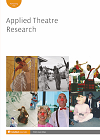
Full text loading...

Based on the authors’ previous academic exchange and observations, translation of terms related to drama and theatre from English to Chinese and vice versa is likely to cause misunderstandings. This research investigated what the translation of key terms may reveal about the understandings of drama education in China. Through a desk research, we collected key terms primarily related to drama and theatre from 26 seminal English and Norwegian books in the field of drama education and their Chinese translations, sorting out and comparing the English/Norwegian originals and the Chinese translations of each term. Findings confirmed that the same Chinese expressions had been used for completely different drama-related terms, while applied theatre-related terms may be misleading as the translation may refer to theatre architectures. Elaborating on the understanding of drama and theatre in China and the new drama praxis, the Drama Etudes, this study discusses what the term ‘drama education’ may refer to in the Chinese context. The overall aim of this study is to contribute to an extended understanding of drama education and its relevant praxis in a global context.

Article metrics loading...

Full text loading...
References


Data & Media loading...

Publication Date:
https://doi.org/10.1386/atr_00066_1 Published content will be available immediately after check-out or when it is released in case of a pre-order. Please make sure to be logged in to see all available purchase options.